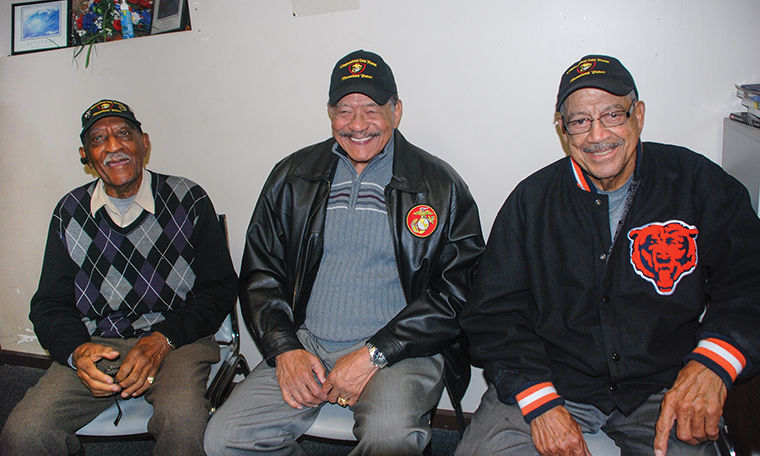First black U.S. Marines celebrated for Veteran’s Day
Some of the first black soldiers to serve in the U.S. Marines Corps.
November 17, 2014
Before 1942 blacks were not allowed to serve in the U.S. Marine Corps. A year later Chicago-native James Reynolds became one of the first black Marines to go to war.
Reynolds, now 87, served in the Marines from 1943–1946 and in the U.S. Army from 1950–1952, where he attained the rank of staff sergeant. Reynolds also received three Bronze Stars, the Korean Service Medal, National Defense Medal, National Service Medal and the Good Conduct Medal in his tenure in the military.
Reynolds was one of the original black Marines to train on Montford Point at Camp Lejeune, one of the largest Marine bases, located in North Carolina. He said the Marines leased a plantation several hundred yards away at Montford Point, where the original 400 black soldiers were trained because blacks were not allowed to train on the base of Camp Lejeune with white soldiers.
Reynolds said after being segregated for approximately 69 years, Montford Point was recognized as part of the Marine Corps in 2011, even though the troops fought in World War II and the Korean War. General James Amos made the decision to recognize the Montford Point troops, and in 2012, they were awarded the highest medal given by Congress.
Wendell Ferguson, an 88-year-old veteran originally from Dallas, Texas, served in the Marine Corps and obtained the sergeant rank while serving in the Korean War from 1950–1951. He also served in World War II, but said blacks were not allowed in combat at that time.
“We were trained to fight, but our main job was work detail,” Ferguson said. “They called us the black angels because we would bring back the wounded.”
In remembrance of the first black Marines to serve in the Marine Corps at the Montford Point base in North Carolina, The Montford Point Marine Association, a nonprofit veteran’s organization, was founded and sixty-five years ago the Chicago Chapter was founded. Reynolds has been a member for the last 22 years, and he serves as the financial secretary.
Ferguson, who has been a member of MPMA for 39 years, said he remembers how segregated the U.S. was and how its past segregation in the military compares to today’s armed forces.
“When we went in, they had blacks that had degrees, but they still couldn’t be nothing but a private,” Ferguson said. “Degrees didn’t mean nothing, but if you were white and you had a degree, you automatically were sent to Officer Candidate school or [were] inducted in as an officer.”
Ferguson said until 1945 all the instructors at Montford Point were white. Fred Branch, the first black officer for the Marines, did not earn the title until 1945. He said the Marine Corps is coming along, but there are still only three black lieutenant generals in the Marines, with Frank Peterson being the first.
John Vanoy, a Chicago resident, served in World War II in the 52nd defense battalion in a 90m Gun Crew from 1944–1946, and was also one of the first black Marines who trained on Montford Point. Vanoy said he remembered facing racism and discrimination frequently, but especially on trains when they were traveling. He said they were not allowed to eat at certain restaurants and had to go through back doors at businesses.
“That was a way of life then. It was not only in North Carolina—it was throughout the country,” Vanoy said. “We experienced it in Chicago, we experienced it going there, we experienced it on the trains coming back, in the service [and] everything.”
Reynolds said it was hard dealing with discrimination throughout his life, but it was just as hard as being drafted and fighting in the wars. He said the Korean War is something he does not like to talk about very often, but that he vividly remembers how cold it was.
“No point in getting scared, just try to save your behind,” Reynolds said. “When you’re in combat, you’re in combat. I’m more scared now than I was then.”
Reynolds said this is why it is so important for people to celebrate and recognize veterans. He said men and women fought hard for the country and risked their lives every day on the battlefield so Americans could enjoy their freedom.
“This is one of the reasons why we appreciate Veterans Day—because we’re still here,” Reynolds said. “There are vets that [don’t come back], never…and sometimes it bothers you how I could be here and they’re gone.”








